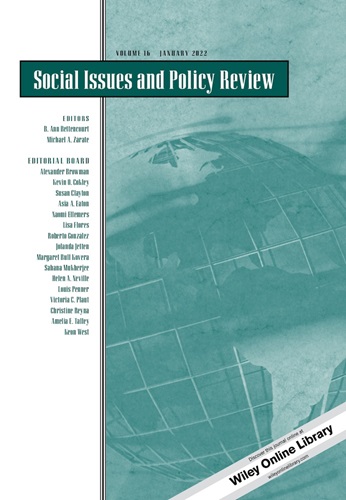求助PDF
{"title":"Structural racism and health in the age of COVID‐19: A selective review with policy implications","authors":"E. Brondolo, Amandeep Kaur, Melissa Flores","doi":"10.1111/sipr.12095","DOIUrl":null,"url":null,"abstract":"Structural racism encompasses the effects of racial bias across all systems of society. A growing body of data indicates that structural racism contributes to racial inequities in health across the lifespan. Investigators have documented associations of different dimensions of structural racism, including cultural and institutional discrimination, to health. To clarify and integrate the scope of these data, we examine a broad array of manifestations of both cultural and institutional racism and review their associations to specific health effects outcomes. We examine effects on COVID-19 prevalence and mortality, but also investigate data on birth outcomes and premature mortality to gain insight into health effects at each end of the lifespan. Given the pervasive and well-documented history of racism facing Black Americans, we focus this review on the effects of structural racism on the health of Black populations in the United States. To examine the association of cultural discrimination to health, we review studies of prejudicial communications assessed with measures of area-level prejudice, leader communications of prejudice, and reactions to race-related cultural events. To examine the association of institutional discrimination to health, we examine laws and institutional policies that discriminated against Black Americans and shaped social and physical environments characterized by residential racial segregation and disadvantage, occupational segregation, and restricted voting rights, among other manifestations of inequity. As we document, research has demonstrated associations of cultural racism to birth outcomes and mortality, data are lacking on direct relations to COVID-19 mortality. Institutional discrimination has been consistently linked to the increased prevalence of and mortality from COVID-19, and some aspects are associated with birth outcomes and mortality. Understanding the interrelations among cultural and institutional aspects of discrimination and their historical roots have important implications for the development of policies and interventions to reduce structural racism and mitigate its effects on health. © 2023 The Society for the Psychological Study of Social Issues.","PeriodicalId":47129,"journal":{"name":"Social Issues and Policy Review","volume":"1 1","pages":""},"PeriodicalIF":7.2000,"publicationDate":"2023-01-01","publicationTypes":"Journal Article","fieldsOfStudy":null,"isOpenAccess":false,"openAccessPdf":"","citationCount":"2","resultStr":null,"platform":"Semanticscholar","paperid":null,"PeriodicalName":"Social Issues and Policy Review","FirstCategoryId":"102","ListUrlMain":"https://doi.org/10.1111/sipr.12095","RegionNum":1,"RegionCategory":"心理学","ArticlePicture":[],"TitleCN":null,"AbstractTextCN":null,"PMCID":null,"EPubDate":"","PubModel":"","JCR":"Q1","JCRName":"PSYCHOLOGY, SOCIAL","Score":null,"Total":0}
引用次数: 2
引用
批量引用
2019冠状病毒病时代的结构性种族主义与健康:一项具有政策意义的选择性审查
结构性种族主义包括所有社会制度中种族偏见的影响。越来越多的数据表明,结构性种族主义导致了一生中健康方面的种族不平等。调查人员已经记录了结构性种族主义的不同层面,包括文化和体制歧视,与健康的关联。为了澄清和整合这些数据的范围,我们研究了文化和制度种族主义的广泛表现形式,并审查了它们与特定健康影响结果的关联。我们研究了对COVID-19流行率和死亡率的影响,但也调查了出生结果和过早死亡的数据,以深入了解生命周期各个阶段对健康的影响。鉴于美国黑人所面临的种族主义的普遍和充分记录的历史,我们将本综述的重点放在结构性种族主义对美国黑人人口健康的影响上。为了检验文化歧视与健康的关系,我们回顾了用地区层面偏见、领导者偏见沟通和对种族相关文化事件的反应来评估偏见传播的研究。为了研究制度歧视与健康的关系,我们研究了歧视美国黑人的法律和制度政策,并研究了以居住种族隔离和劣势、职业隔离和限制投票权为特征的社会和物理环境,以及其他不平等的表现。正如我们所记录的,研究表明,文化种族主义与出生结果和死亡率存在关联,但缺乏与COVID-19死亡率直接相关的数据。体制歧视一直与COVID-19的患病率和死亡率上升有关,某些方面还与出生结果和死亡率有关。了解歧视的文化和体制方面及其历史根源之间的相互关系,对于制定减少结构性种族主义和减轻其对健康的影响的政策和干预措施具有重要意义。©2023社会问题心理研究学会。
本文章由计算机程序翻译,如有差异,请以英文原文为准。


